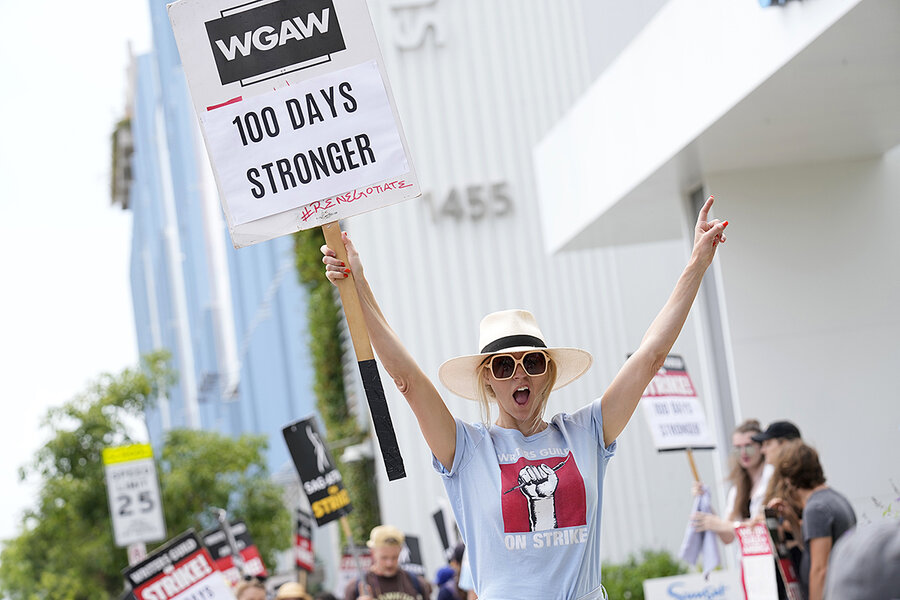Hollywood’s summer of strikes: Three questions
Loading...
In Hollywood, the only thing that lasts forever is “The Simpsons.” But the twin strikes by writers and actors are beginning to feel endless, too.
The Writers Guild of America has been picketing for over 100 days. In July, it was joined by the Screen Actors Guild-American Federation of Television and Radio Artists. Both unions spent much of the summer at an impasse in their respective contract renegotiations with the Alliance of Motion Picture and Television Producers. On Friday, the writers union and studios agreed to formally resume negotiations.
Why We Wrote This
Hollywood’s twin strikes have so far cost California’s economy an estimated $3 billion. With writers and studios agreeing to resume negotiations, what would it take to reach agreement?
No one can predict how long the twin strikes will last, says Brian Welk, senior business reporter for IndieWire, a film industry site. But, he adds, “I do think it’s going to be prolonged.”
The two sides are in a financial game of chicken to see who will be first to blink.
Neither strike has yet entered record-breaking territory. The longest actors strike in history ran for six months in 2000, while the longest writers strike was for 154 days in 1988.
In Hollywood, the only thing that lasts forever is “The Simpsons.” But the twin strikes by writers and actors are beginning to feel endless, too.
The Writers Guild of America has been picketing for over 100 days. In July, it was joined by the Screen Actors Guild-American Federation of Television and Radio Artists (SAG-AFTRA). Both unions spent much of the summer at an impasse in their respective contract renegotiations with the Alliance of Motion Picture and Television Producers. On Friday, the writers union and studios agreed to formally resume negotiations.
Why are they striking?
Why We Wrote This
Hollywood’s twin strikes have so far cost California’s economy an estimated $3 billion. With writers and studios agreeing to resume negotiations, what would it take to reach agreement?
Both unions overlap in two major issues at the core of their disputes with studios. The first is how producers will utilize artificial intelligence. Actors and writers want to protect their jobs by implementing guidelines over the use of AI. The second, and predominant issue, concerns royalty rates. Writers and actors have traditionally been paid for their work each time their movie or TV episode airs in reruns. The streaming business model has rendered that model of compensation outdated.
“Now each individual piece of content doesn’t necessarily make money on its own,” says Ben Fritz, author of “The Big Picture: The Fight for the Future of Movies.” “It’s just one thing that you may watch on a streaming service that you pay maybe $15 a month for. And most significantly, the streaming services like Netflix and Max and Disney+ do not tell anyone how many times something is watched.”
The studios argue that they have yet to turn a profit from streaming services. (The one exception is Netflix.) They believe that the additional labor costs and residual payments that unions are asking for will make it even more difficult to get out of the red.
“Those contracts obviously constrain the studios and what they can do. And they’re saying, ‘You know, that isn't fair. We should wait until we figure out the model,’” says Mr. Fritz. “The unions’ position is: If we wait until you've got a healthy model that you like and then we come begging for a piece of it, it’s going to be too late. Then you're going to have us over a barrel.”
What does that mean for new TV and movies?
In early August, Ryan Reynolds attended a game with the Welsh soccer team Wrexham AFC, which he co-owns. He brought along a special guest: Hugh Jackman. Weeks earlier, the duo had been filming “Deadpool 3,” featuring Mr. Reynolds as the titular character and Mr. Jackman as Wolverine. It was one of the first productions to halt filming due to the actors strike. If picketing continues, Mr. Reynolds may see many more games this season.
“Deadpool 3” is among 73 productions that are now on hold. Productions on hiatus include sets in Australia, Morocco, New Zealand, and the United Kingdom. The strike’s impact was even felt at the end of the yellow brick road in Oz. A cast of witches in the cinema adaptation of the musical “Wicked” has put down its broomsticks and picked up protest signs.
Some big-name actors, including Anne Hathaway, Paul Rudd, and Dakota Fanning, are still filming. SAG-AFTRA granted waivers to 58 movies and four TV series that aren’t affiliated with any of the major studios represented by the Alliance of Motion Picture and Television Producers.
Due to the long lead time of cinema releases, the delays may not be noticeable for a while. But both Disney and Sony Pictures recently pushed back the release dates of several 2024 movies.
The impact is more immediately noticeable on TV. In place of scripted series, the networks’ fall schedules are loaded with reality shows and sports. CBS is importing Season 1 of the hit Kevin Costner drama “Yellowstone” from sister streaming network Paramount+. Meanwhile, it’s easier than ever to win big on “Jeopardy!” With its writers on strike, the game show’s new episodes will be recycling old questions.
Finally, spare a thought for Tim Burton. The director had been in Vermont with Michael Keaton and Winona Ryder filming a long-awaited sequel. (The name should not be spoken three times – we’ll mention it just this once: “Beetlejuice.”) The production had just one sequence left to film when the strike hit. Since the shutdown, several props have been stolen.
What could lead both sides to come to an agreement?
No one can predict how long the twin strikes will last, says Brian Welk, senior business reporter for IndieWire, a film industry site. But, he adds, “I do think it’s going to be prolonged.”
The two sides are in a financial game of chicken to see who will be first to blink.
Neither strike has yet entered record-breaking territory. The longest actors strike in history ran for six months in 2000, while the longest writers strike was for 154 days in 1988.
In July, Dwayne Johnson made a seven-figure donation to the SAG-AFTRA Foundation Emergency Financial Assistance Program. Since then, a number of other A-list actors have also donated more than $1 million each. It’s a big boost to the union’s 160,000 members. But many of them have already had to take out loans from the Screen Actors Guild credit union.
On the other side, the studios and streaming services appear to be united. But how long before individual companies break ranks and push the others toward settlement? It depends on whether movies and TV are core to their business, or just one division within a multiproduct corporation like Amazon and Apple.
“Not all the studios are created equal,” says Mr. Welk. “Disney at least has parks to fall back on, and other things. But if you’re just a content company like Paramount or Warner Bros. and now you can’t produce shows ... you’re going to start to feel the pinch.”
Netflix, the only profitable streaming service, seems best equipped to weather the strike. It has a deep pipeline of content to draw from, says Mr. Welk. Even so, there may be a limit to how long subscribers will be happy to subsist on leftovers of USA’s “Suits” while new episodes of premium originals such as “Stranger Things” are delayed by the strikes.
Several other factors may propel a resumption of negotiations. One economist estimates that the writers strike, which has passed 100 days, has cost the California economy $3 billion. The state’s governor, Gavin Newsom, may get a starring role in this drama. He recently offered to help broker a deal between the writers and studios, which have returned to the bargaining table. If they come to an agreement, that may put pressure on actors to follow suit. At some point, the end credits will roll on this story.
Correction: This article has been updated to include the correct title of the SAG-AFTRA Foundation Emergency Financial Assistance Program.









